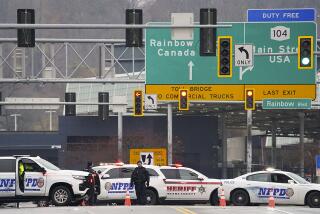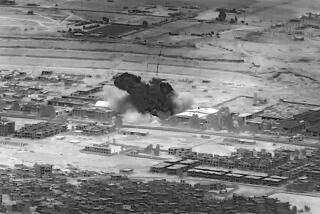23 killed in bombings on 2 bridges
- Share via
BAGHDAD — Within hours of Friday prayer services’ end, two suicide car bombers struck checkpoints at Baghdad bridges in quick succession, killing 23 Iraqis, injuring 57 and crippling the key passageways from the capital to the country’s south. Among those killed were 10 Iraqi police officers and soldiers.
The first suicide car bomber detonated his cargo before dusk over an old two-lane bridge on the Diyala River, a tributary of the Tigris.
Minutes later, a tanker truck loaded with explosives rammed a second bridge on the Diyala, a four-lane metal structure built after the U.S.-led invasion in 2003.
Mohammed Ridha Ali, 36, was three or four cars behind the bomber on the old bridge. “When the explosion happened I didn’t see anything. I passed out immediately,” Ali, a Health Ministry employee, said. “Next thing I knew, I was in Zafaraniya hospital with injuries on my abdomen and left side.”
Street vendor Adil Radi, 25, said he rushed to help the victims. Ambulances were able to quickly ferry the injured to hospitals, he said, because the streets were clear of traffic on the Muslim holy day.
Insurgents have repeatedly targeted bridges in Baghdad. The newer bridge over the Diyala already bore a hole from a recent suicide bombing.
The largest span to be destroyed was the steel-girder Sarafiya Bridge in north Baghdad, in a suicide bombing April 12 that sent cars plunging into the Tigris and killed at least 10 people.
Meanwhile, a series of U.S.-led raids across Iraq to dismantle bomb-making cells and other militant networks ended Friday, the military said. Four suspected insurgents were killed and nine were detained.
In east Baghdad, one U.S. soldier was killed and two injured in a roadside bombing as they patrolled the area Thursday to clear neighborhoods of insurgents, the military announced Friday.
Troops converged early Friday on a building near Taji, an air base 12 miles north of Baghdad, after obtaining information that it housed a cell responsible for car bomb attacks on Iraqi civilians and U.S.-led forces, the military said.
Four men were killed in a gun battle, one of whom was suspected to be a leader of the cell with ties to top officials in Al Qaeda in Iraq, the military said.
In the northern city of Kirkuk, a U.S.-Iraqi security sweep found the decapitated remains of an Iraqi national intelligence captain, Fatah Hasan Ahmed, who was abducted two weeks ago by militants, police said. Eleven people were arrested in the sweep, but it was unclear whether they were involved in the slaying.
The military has been focusing on disrupting factories making car bombs after a series of attacks across the country in recent weeks, including in relatively placid Kufa in the south and Irbil in the semiautonomous Kurdish north.
Many of the raids over the last weeks have been in Sadr City, the impoverished neighborhood in northwest Baghdad, under the leadership of anti-U.S. Shiite cleric Muqtada Sadr.
During Friday prayers at the Hikma Mosque in the neighborhood, cleric Sheik Suhail Uqabi denounced the U.S.-led military action.
“People are sleeping on the roofs of their homes because they have no electricity inside, and the Americans are using their helicopters to harm ordinary families. Meanwhile, the Iraqi government is not trying to find any solution and instead stood unified to receive Dick Cheney and other American officials,” Uqabi said, referring to the American vice president’s visit this week.
garrett.therolf@latimes.com
Special correspondents in Baghdad and Kirkuk contributed to this report.
More to Read
Sign up for Essential California
The most important California stories and recommendations in your inbox every morning.
You may occasionally receive promotional content from the Los Angeles Times.















